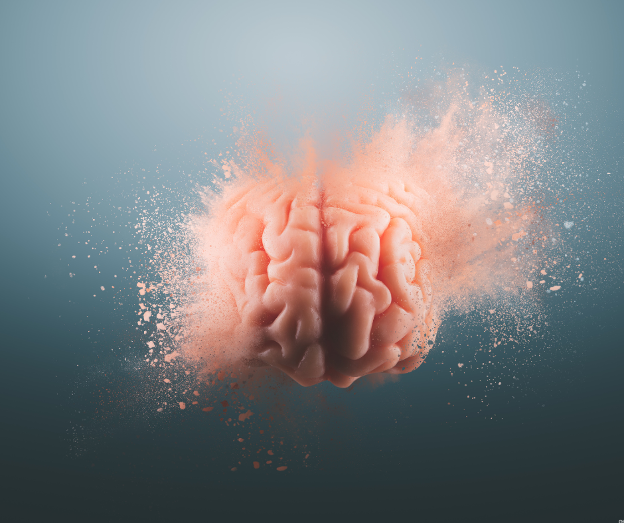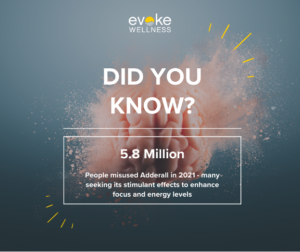You pop another Adderall, hoping this latest pill will help you focus and be productive. But have you considered what this amphetamine is really doing to your body and brain? Let’s examine the science behind those little pills you might be taking a bit too often. From how Adderall affects your central nervous system to the withdrawal symptoms that can occur, understanding the drug’s mechanisms and risks allows for smarter and safer usage. Arm yourself with facts so you can make informed choices about Adderall and amphetamine use. Consider options like therapy or an addiction treatment program if your use has become unhealthy. Knowledge is power, so read on to empower yourself when it comes to Adderall.
If you or a loved one is considering treatment, Evoke Wellness invites you to contact us. Our compassionate team is ready to answer your questions, discuss your needs, and help you take the first steps toward recovery. At Evoke Wellness, you will find more than just a treatment program – you’ll discover a community dedicated to your wellness and success. Together, let’s embrace the journey to recovery and the promise of a new beginning. Call us at (866)429-2960 today or reach out online.
What Is Adderall?
A Stimulant Medication
Adderall is a prescription medication containing amphetamine and dextroamphetamine. These are central nervous system stimulants that affect chemicals in the brain and nerves related to hyperactivity and impulse control.
- Primarily used to treat attention deficit hyperactivity disorder (ADHD) and narcolepsy.
- Works by increasing the levels of certain neurotransmitters like dopamine and norepinephrine.
Controlled Substance
Adderall is classified as a Schedule II controlled substance due to its high potential for abuse and dependence.
- The U.S. has seen a sharp rise in Adderall misuse, with over 5% of high school seniors abusing it.
- Misuse can lead to addiction, cardiovascular issues, psychosis and other health problems.
Professional Treatment Options
If struggling with Adderall addiction, seek help from an accredited treatment provider like Union Care that offers:
- Intensive outpatient program
- Intensive inpatient treatment program
- Partial hospitalization program
- Residential treatment
- Rehab aftercare support
- Family program
Getting comprehensive, evidence-based care increases the chances of achieving lasting recovery.
How Does Adderall Affect the Brain and Body?
Adderall is a central nervous system stimulant that directly impacts your brain chemistry. When you take this amphetamine medication:
- It increases levels of dopamine and norepinephrine neurotransmitters. This boosts focus, concentration, and motivation.
- It activates the brain’s reward pathways associated with pleasure and addiction.
- Side effects can include insomnia, appetite suppression, anxiety, and cardiovascular strain. Overstimulating these pathways risks developing substance use disorders.
Long-term Adderall misuse can lead to serious health consequences. These include malnutrition, psychosis, cardiac arrhythmia, and physical dependence. If you struggle with addiction, seek professional help through programs like Union Care’s intensive outpatient treatment, residential rehab, or continuing care plans. Recovery starts with reaching out.
Adderall Side Effects
Physical Effects
While Adderall can help improve focus and concentration, it comes with potential physical side effects. Common ones include:
- Decreased appetite and weight loss
- Headaches and dizziness
- Dry mouth and dehydration
- Nausea and stomach pain
- Increased heart rate and blood pressure
Psychological Impacts
Adderall doesn’t just affect your body – it can also impact your mental state. Watch for signs like:
- Anxiety, agitation or mood swings
- Insomnia or trouble sleeping
- Irritability and aggression
- Hallucinations in overdose cases
Is Adderall Addictive?
Adderall, a prescription amphetamine medication, can be highly addictive when misused or taken without medical supervision. According to the National Survey on Drug Use and Health, around 5.8 million people misused Adderall in 2021 – many seeking its stimulant effects to enhance focus and energy levels.
Physical Dependence
- With regular use, your brain becomes reliant on Adderall’s dopamine-boosting effects.
- Trying to quit cold turkey often leads to withdrawal symptoms like fatigue, depression and intense cravings.
Psychological Addiction
- Some users become psychologically addicted, constantly thinking about and craving Adderall.
- They may prioritize obtaining and using the drug over other important life activities.
Union Care offers comprehensive addiction treatment programs to help overcome Adderall dependence, including:
- Intensive outpatient program
- Intensive inpatient treatment program
- Partial hospitalization program
- Residential treatment
- Rehab aftercare support
- Family program
Seek professional help if you or a loved one is struggling with Adderall addiction. Recovery is possible with the right support system.
Getting Treatment for Adderall Addiction
Professional Help is Vital
Recovering from Adderall addiction requires professional help. Attempting to quit “cold turkey” can be extremely difficult and even dangerous due to severe withdrawal symptoms. Seeking proper treatment gives you the medical supervision and therapeutic support needed for a safe, lasting recovery.
Treatment Options
Effective Adderall addiction treatment usually involves a combination of detox, counseling, and aftercare planning. Some common program types include:
- Intensive Outpatient Programs (IOPs)
- Intensive Inpatient/Residential Programs
- Partial Hospitalization Programs (PHPs)
Personalized Care
The ideal program will depend on your specific needs, addiction severity, mental health, and other factors. Reputable rehab centers like Evoke Wellness provide personalized treatment plans utilizing evidence-based therapies, holistic care, and family support.
Ongoing Recovery
Overcoming Adderall addiction is an ongoing process that doesn’t end after completing a rehab program. Continuing with counseling, 12-step meetings, sober living, or other aftercare support can help prevent relapse and promote long-term sobriety.
FAQs: Adderall Side Effects
What are common Adderall side effects?
- Difficulty sleeping or insomnia
- Decreased appetite and weight loss
- Headaches and dizziness
- Dry mouth and dehydration
- Nausea and stomach pain
- Anxiety, irritability, mood swings
How long do side effects last?
Most side effects start within 1-2 hours of taking Adderall and can persist for 4-8 hours or more depending on the dosage. However, some effects like trouble sleeping may last much longer.
Are there serious risks?
Yes, Adderall can potentially cause serious cardiovascular side effects like increased blood pressure, heart palpitations and even heart attack or stroke – especially with high doses or misuse. Mental health risks include psychosis, mania and addiction.
How can I manage side effects?
Drink plenty of fluids, get enough sleep, take breaks from the medication when possible, and speak to your doctor about adjusting dosage. Never take more than prescribed. Seek addiction treatment like intensive outpatient programs if struggling with misuse.
Conclusion
So in summary, Adderall can provide short-term benefits for those with ADHD, but also poses risks like addiction and side effects. Consider your motivations carefully before taking it. If you’re already taking Adderall, be vigilant about signs of dependence. And if you think you may be addicted, don’t wait to seek help. Reach out to a treatment center like Union Care for their addiction programs. With their help, you can overcome dependence and regain control of your health and wellbeing.
Begin Your Journey with Evoke Wellness
If you or a loved one is considering treatment, Evoke Wellness invites you to contact us. Our compassionate team is ready to answer your questions, discuss your needs, and help you take the first steps toward recovery. At Evoke Wellness, you will find more than just a treatment program – you’ll discover a community dedicated to your wellness and success. Together, let’s embrace the journey to recovery and the promise of a new beginning. Call us at (866)429-2960 today or reach out online.



